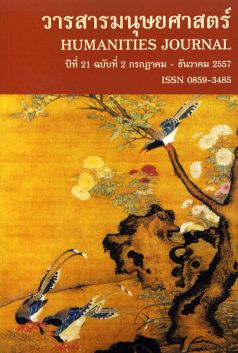อัษรและรัฐ: การปฏิรูปอักษรจีนในปลายราชวงศ์ชิงถึงสาธารณรัฐจีน
Main Article Content
Abstract
การปฏิรูปอักษรจีนเป็นที่ถกเถียงกันในหมู่ปัญญาชนจีนมาตั้งแต่คริสต์ศตวรรษที่ 19 เมื่อจีนตกอยู่ในสภาพอ่อนแอและล้าหลัง ทั้งยังเผชิญกับภัยคุกคามของมหาอำนาจจากตะวันตก ชนชั้นนำและปัญญาชนจีนบางส่วนจึงต้องารปฏิรูปประเทศจีนเพื่อให้ทันสมัย ภาษาจีนถูกมองว่าเป็นอุปสรรคต่อการพัฒนาสู่ความทันสมัย เนื่องจากภาษาจีนและตัวอักษรจีนซับซ้อน เข้าใจยาก ปัญญาชนหัวก้าวหน้าร่วมกันขับเคลื่อนความคิดที่จะปฏิรูปภาษาจีนในสังคม จนกลายเป็นขบวนการสร้างบูรณาการทางภาษาแห่งชาติ ซึ่งรวมถึงการปฏิรูปอักษรจีนด้วย บทความนี้นำเสนอภาพรวมพัฒนาการทางประวัติศาสตร์ของการปฏิรูปอักษรจีนด้วย บทความนี้นำเสนอภาพรวมพัฒนาการทางประวัติศาสตร์ของการปฏิรูปอักษรจีน เพื่อทำความเข้าใจปัจจัย แนวทาง บทบาทของปัญญาชน รวมถึงพลวัตของภาษาภายใต้บทบาทของรัฐในการกระชับอำนาจทางวัฒนธรรมแบบหนึ่ง ซึ่งแสดงให้เห็นความสัมพันธ์ที่ซับซ้อนระหว่างรัฐ ปัญญาชน ภาษา อักษร วรรณกรรม และสังคม อันเป็นปัจจัยสำคัญของการก่อรูปภาษาจีนสมัยใหม่มาจนถึงปัจจุบัน
Letters and State: Script Reforms from Late Qing
to Republican China
Kornphanat Tungkeunkunt
The issue of script reform has been discussed among Chinese
intellectuals since the 19th century. When entering the modern era, Chinese
language was criticized as an obstacle to mass education, for it seemed
too difficult to study, especially Chinese scripts that were deemed
complicated. Therefore, progressive-minded Chinese intellectuals believed
the reform of Chinese language including Chinese script reform was
inevitably necessary for China’s modernization. This article presents an
overview of historical development of Chinese script reforms. It
demonstrates the multifaceted relations between state, intellectuals,
language, letters, literature and society, which were crucial factors in the
formation of modern Chinese today.


